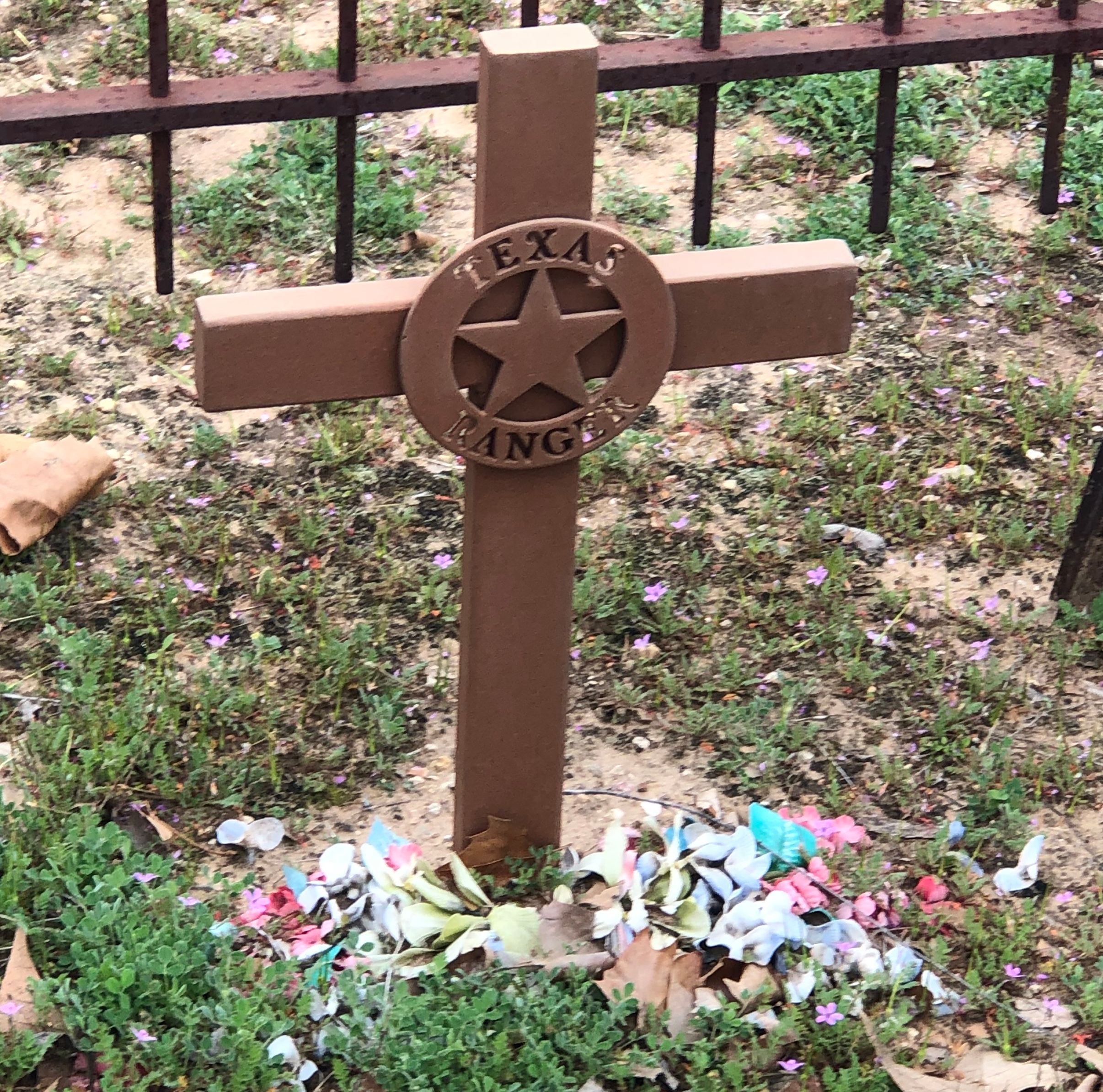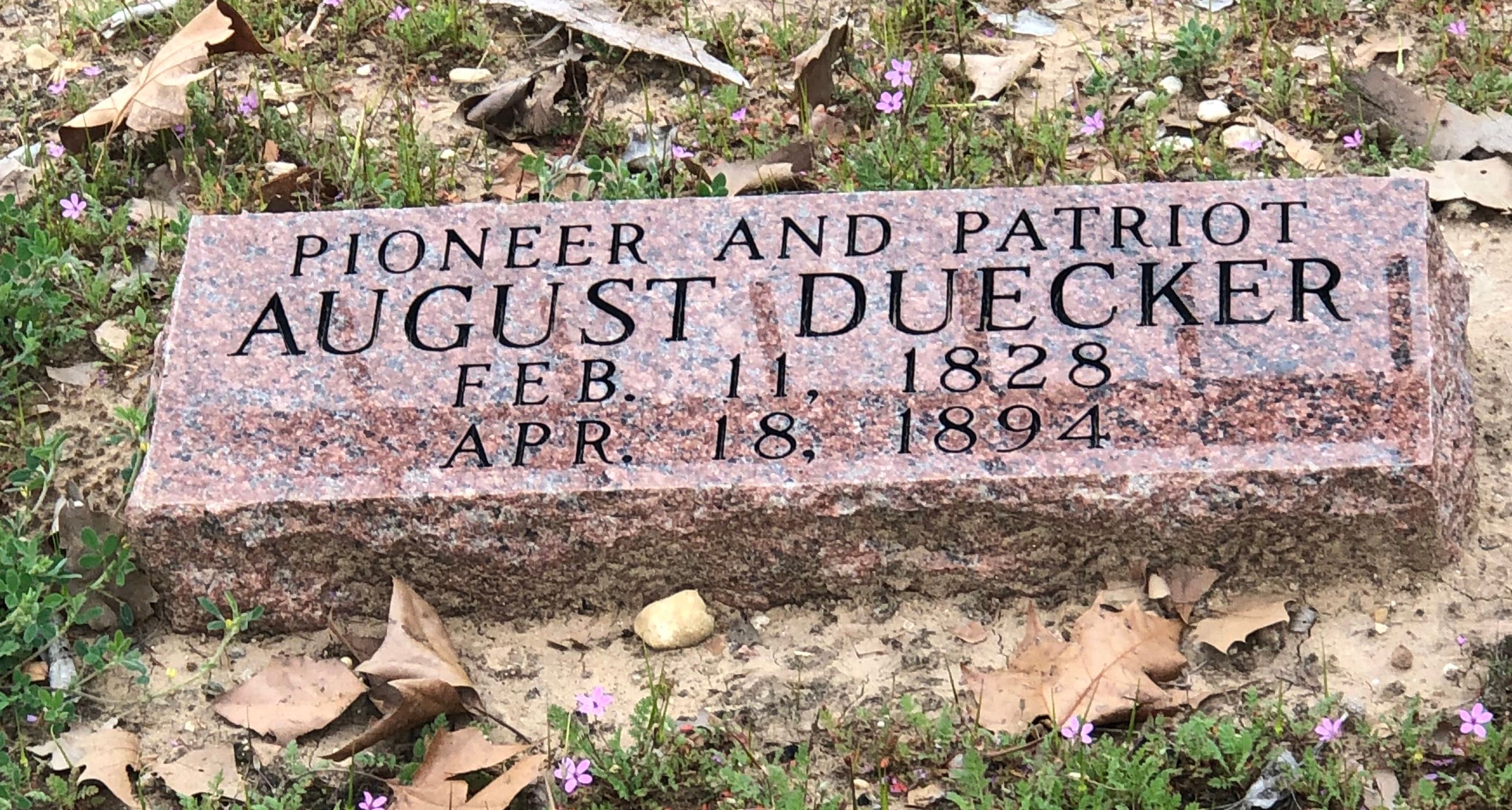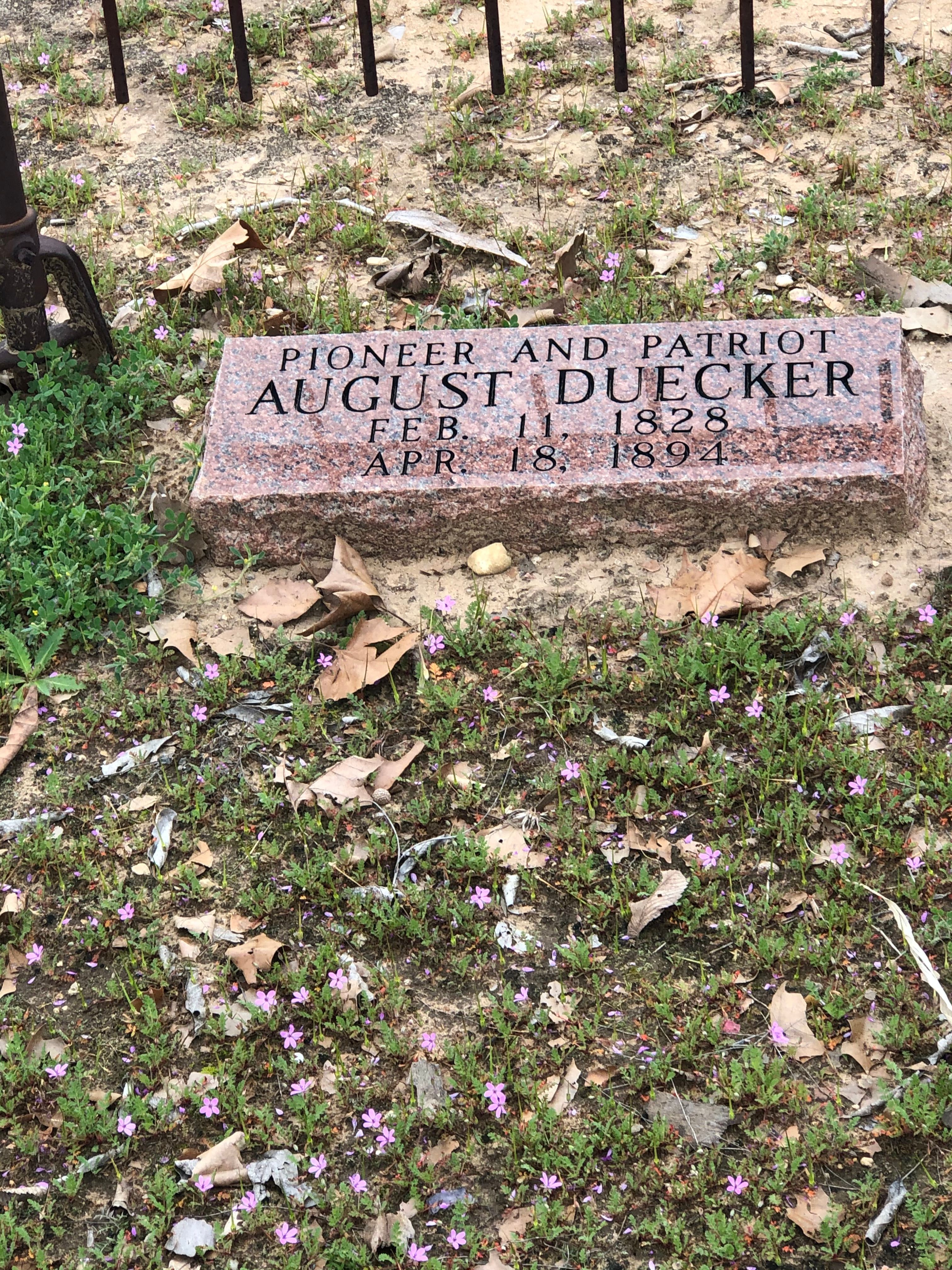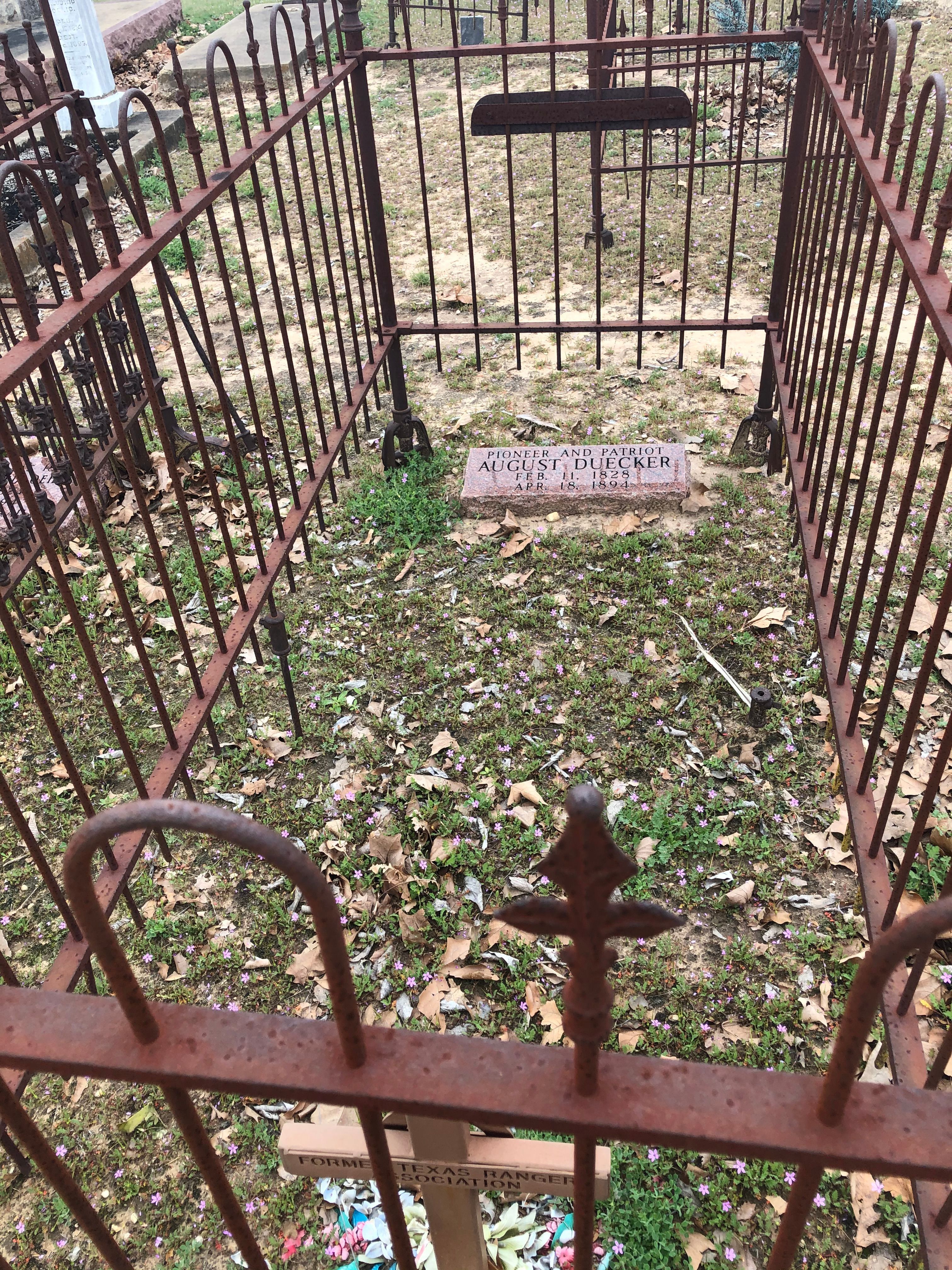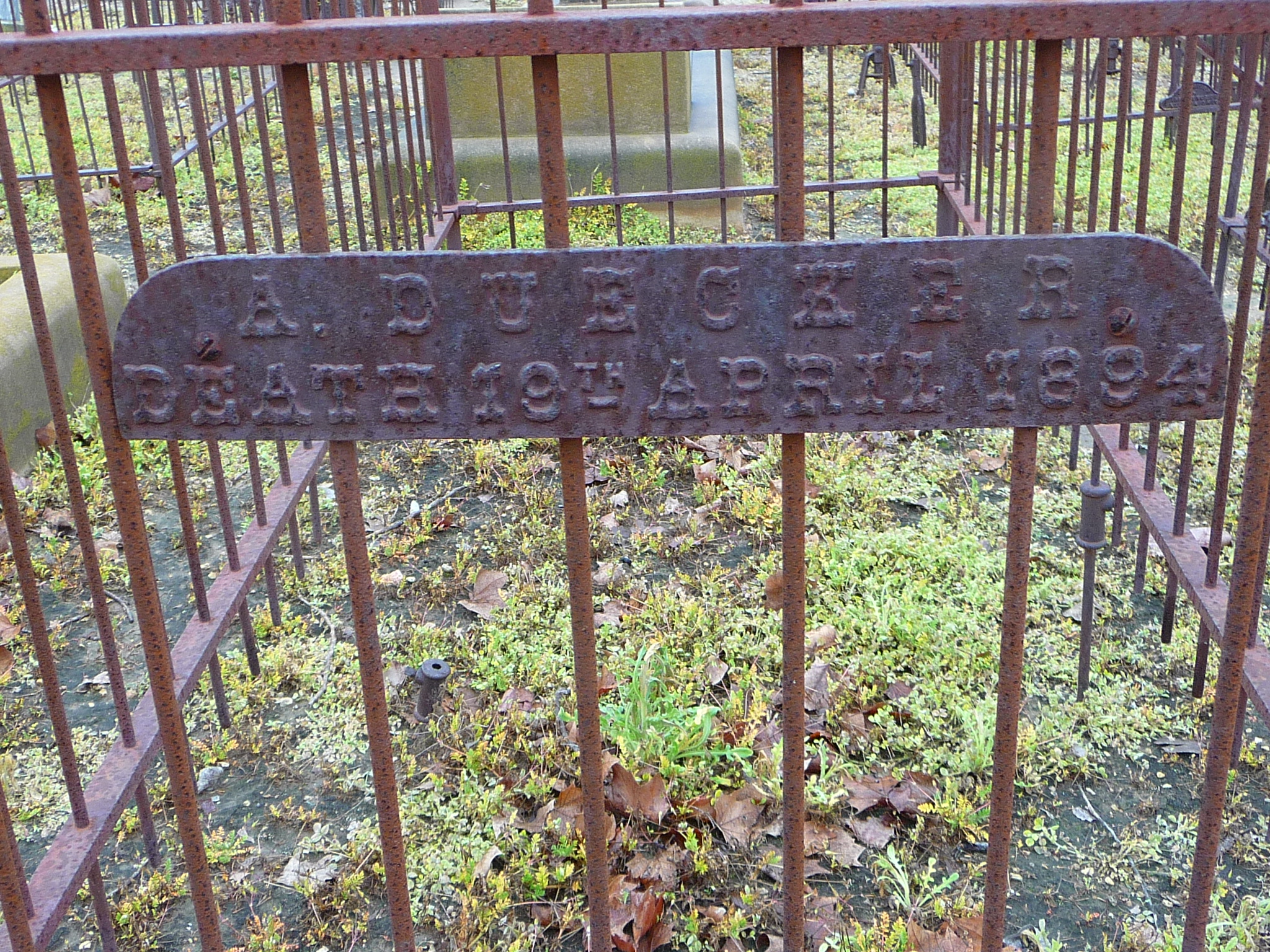h/o Wilhelmine Knetsch Lindemann - m. 22 Feb 1866
s/o Johann G Ducker b 23 Sept 1798, Emmerzhausen, Germany d 19 Jul 1831
S/o Maria E Sauer b 10 Jun 1825 Biersdorf, Germany
Notes from "The Junior Historian," by Lottie Helen Gold, Fredericksburg, High School, no date
August Duecker, Pioneer Hill Country Rancher
The present generation, living in well organized communities and surrounded by all of the comforts that are seemingly indispensable in modern life, can hardly conceive or properly appreciate the hardships and privations of the early Texas pioneers struggling with the difficulties and dangers of frontier life, Texans of the twentieth century have every reason to hold these men and women in cherished and revered remembrance.
August Duecker was a Texas pioneer who was born in Altenkirchen in the German Kingdom of Hannover, in 1828. Like many other Europenas, he became dissatisfied with conditions in his homeland and decided to immigrate to America. In America the young immigrant hoped to live under a republican form of government which would protect his personal, religious, and political liberties, free from the petty tyrannies and many disadvantages and evils of the old country.
In 1852, when Duecker was only twenty-four years of age, he and a half-brother, Reinhold Betz, came to Texas and immediately settled in Fredericksburg. Duecker joined the Holy Ghost Lutheran Church, and shortly before the Civil War, he married Louisa Feuge. They became the parents of four children--Rosalie, Amalie, August, Jr., and Louisa.
This family circle was soon broken. Shortly after the birth of Louisa, Mrs. Duecker became ill from exposure after she had delivered food and supplies to her husband and other members of a party of Unionist sympathizers who had been forced into hiding. During her illness, Mrs. Duecker was under the medical care of Dr. William Keidel, who advised the family to summon the young husband at once. At the advice of his family, who feared that his presence might be discovered, Duecker remained in hiding in the attic above the room of his dying wife.
At the death of Mrs. Duecker, the infant Louisa was cared for by a Mrs. Ochs, who had only recently lost her own infant. The other children were cared for by Dr. Althaus, another pioneer physician of Gillespie County.
Still in hiding, August Duecker succeeded in getting to Mexico, where he stayed about two years during the Civil War. Toward the end of the conflict, he and two of his companions, Friedrich Hahn and a Mr. Simon, managed to return to Texas, but the unfortunate men were soon captured and confined in a military prison in San Antonio.
Mrs. Simon smuggled tools to her husband by sewing them in the hems of her garments. Eager to make their escape, the prisoners dug through the heavy prison wall, hiding the rubble from the excavation in their straw sack bedding and discoloring the break in the wall with stains of coffee grounds. At last they succeeded in breaking through the heavy prison wall only to discover that the escape passage was too small for Mr. Simon, who was a large man. Duecker and Hahn hesitated to leave until their friend had convinced them that this was the best course to follow, whereupon the two smaller men made their escape.
With heavy shackles locked to his ankles, Duecker managed to hobble painfully for seven miles to a blacksmith friend who removed the chains. Here the fugitive procured horses to return to his Hill Country home. The terrible war had ended only to let the Southerners now come home and face the suffering and privations of Reconstruction days and, in Gillespie County area, the cowardly acts of "Haengerbande", a group of outlaws who terrorized the Hill Country.
In 1865, August Duecker married Mrs. Wilhelmina Lindemann of New Braunfels. They became the parents of seven sons, one of whom is still living, Reinhold Duecker, of Fredericksburg, who is nearly ninety years of age.
After the Civil War, August Duecker served as a member of the Texas Rangers as a hide and brand inspector under the appointment of Governor E. J. Davis. In addition to his public service he operated a ranch of several thousand acres in the Cave Creek community.
Duecker died in Fredericksburg on April 18, 1893, at the age of sixty-five years. His life was representative of the experiences of the German settlers of Texas. The pioneers are all dead, and of their sons and daughters--the first of German descent born on Texas soil--only a few remain to tell their children of the life and the struggles of the early frontiersman. With the hope that the interesting records of the part these courageous men and women took in the colonization of Texas may not be lost and forgotten, this history of August Duecker has been written.
In familysearch.org, birthplace is listed as Prussia, Hannover, Preussen.
h/o Wilhelmine Knetsch Lindemann - m. 22 Feb 1866
s/o Johann G Ducker b 23 Sept 1798, Emmerzhausen, Germany d 19 Jul 1831
S/o Maria E Sauer b 10 Jun 1825 Biersdorf, Germany
Notes from "The Junior Historian," by Lottie Helen Gold, Fredericksburg, High School, no date
August Duecker, Pioneer Hill Country Rancher
The present generation, living in well organized communities and surrounded by all of the comforts that are seemingly indispensable in modern life, can hardly conceive or properly appreciate the hardships and privations of the early Texas pioneers struggling with the difficulties and dangers of frontier life, Texans of the twentieth century have every reason to hold these men and women in cherished and revered remembrance.
August Duecker was a Texas pioneer who was born in Altenkirchen in the German Kingdom of Hannover, in 1828. Like many other Europenas, he became dissatisfied with conditions in his homeland and decided to immigrate to America. In America the young immigrant hoped to live under a republican form of government which would protect his personal, religious, and political liberties, free from the petty tyrannies and many disadvantages and evils of the old country.
In 1852, when Duecker was only twenty-four years of age, he and a half-brother, Reinhold Betz, came to Texas and immediately settled in Fredericksburg. Duecker joined the Holy Ghost Lutheran Church, and shortly before the Civil War, he married Louisa Feuge. They became the parents of four children--Rosalie, Amalie, August, Jr., and Louisa.
This family circle was soon broken. Shortly after the birth of Louisa, Mrs. Duecker became ill from exposure after she had delivered food and supplies to her husband and other members of a party of Unionist sympathizers who had been forced into hiding. During her illness, Mrs. Duecker was under the medical care of Dr. William Keidel, who advised the family to summon the young husband at once. At the advice of his family, who feared that his presence might be discovered, Duecker remained in hiding in the attic above the room of his dying wife.
At the death of Mrs. Duecker, the infant Louisa was cared for by a Mrs. Ochs, who had only recently lost her own infant. The other children were cared for by Dr. Althaus, another pioneer physician of Gillespie County.
Still in hiding, August Duecker succeeded in getting to Mexico, where he stayed about two years during the Civil War. Toward the end of the conflict, he and two of his companions, Friedrich Hahn and a Mr. Simon, managed to return to Texas, but the unfortunate men were soon captured and confined in a military prison in San Antonio.
Mrs. Simon smuggled tools to her husband by sewing them in the hems of her garments. Eager to make their escape, the prisoners dug through the heavy prison wall, hiding the rubble from the excavation in their straw sack bedding and discoloring the break in the wall with stains of coffee grounds. At last they succeeded in breaking through the heavy prison wall only to discover that the escape passage was too small for Mr. Simon, who was a large man. Duecker and Hahn hesitated to leave until their friend had convinced them that this was the best course to follow, whereupon the two smaller men made their escape.
With heavy shackles locked to his ankles, Duecker managed to hobble painfully for seven miles to a blacksmith friend who removed the chains. Here the fugitive procured horses to return to his Hill Country home. The terrible war had ended only to let the Southerners now come home and face the suffering and privations of Reconstruction days and, in Gillespie County area, the cowardly acts of "Haengerbande", a group of outlaws who terrorized the Hill Country.
In 1865, August Duecker married Mrs. Wilhelmina Lindemann of New Braunfels. They became the parents of seven sons, one of whom is still living, Reinhold Duecker, of Fredericksburg, who is nearly ninety years of age.
After the Civil War, August Duecker served as a member of the Texas Rangers as a hide and brand inspector under the appointment of Governor E. J. Davis. In addition to his public service he operated a ranch of several thousand acres in the Cave Creek community.
Duecker died in Fredericksburg on April 18, 1893, at the age of sixty-five years. His life was representative of the experiences of the German settlers of Texas. The pioneers are all dead, and of their sons and daughters--the first of German descent born on Texas soil--only a few remain to tell their children of the life and the struggles of the early frontiersman. With the hope that the interesting records of the part these courageous men and women took in the colonization of Texas may not be lost and forgotten, this history of August Duecker has been written.
In familysearch.org, birthplace is listed as Prussia, Hannover, Preussen.
Family Members
Advertisement
Advertisement













